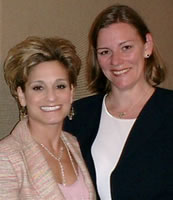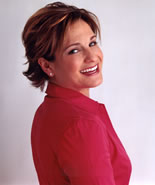


Mary Lou Retton Vaults to "Life Beyond the Bathroom"

Dr. Donnica
with Mary Lou Retton at the American College of Obstetricians and Gynecologists
meeting in San Francisco, May 2005. |
Twenty-one years ago, Mary Lou Retton became the first American woman to win
the All-Around Gold Medal in women's gymnastics and took home more medals than
any other athlete during the 1984 Olympics. Despite her diminutive size - Mary
Lou stands at 4'9" - she is known as one of the most accomplished athletes in
history.
It was her size that led Retton to ignore a serious medical condition for decades.
"I used to have to go to the bathroom constantly, sometimes more than 25 times
a day," she says now. "Unfortunately, I believed the myth that 'little people
have little bladders' and just accepted it. I never made the connection that
my running to the bathroom so often was actually a symptom of a medical condition."
Retton did not find out that what she actually suffered from overactive bladder
(OAB) until she spoke to her doctor about it - years later, after she had had
four children. Today this energetic former Olympian is helping others get help
for OAB by participating in Life Beyond the Bathroom™, an educational
campaign, sponsored by Pfizer, maker of Detrol LA (tolterodine tartrate), a
prescription medication for OAB.
Estimates are that thirty-three million Americans are affected
by OAB, which is associated with involuntary contractions of the bladder muscle.
A person with OAB may feel a sudden and sometimes overwhelming urge to urinate
(urgency). This is because the bladder muscle squeezes or contracts with
only a small volume of urine and without the normal warning signals that capacity
is being reached. This usually results in more frequent urination (frequency),
and sometimes, wetting accidents (urge incontinence).
"I learned to live with having to go to the bathroom all the
time," says Retton. "I worried that someone might notice my condition, so
I kept it a secret like many others do. I would even bring extra leotards
to gymnastics training because I was embarrassed I might have an accident."
Like many sufferers, Retton found ways to cope before finally
talking to her doctor about her secret. "I tried to deal with it by limiting
how much water I drank and making sure I knew where the closest restrooms
were," she says. "But trying to manage the condition on my own became increasingly
difficult. I wish I hadn't waited so long to talk to my doctor.
"When I finally spoke with my doctor, she assured me that I
didn't get OAB from gymnastics or having four kids, and most importantly,
that there was something I could do about it. She prescribed DETROL LA, which
has helped reduce the number of times I go to the bathroom, resulting in my
getting back to the activities I enjoy and reducing some of the worry about
accidents."
Retton urges people who think they may have a bladder problem
- especially women, who are more prone to the condition - to educate themselves,
get the medical help they need, and reduce the worry associated with OAB.
"My OAB was incredibly disruptive. I spent too
much time either in the bathroom or thinking about where I was going to find
the next bathroom. It was agonizing for me to sit in a car pool line when
I picked up my kids from school. And what made it worse was not knowing
the cause of my problem.
"Today, when it comes to my health,
my whole approach is based on being educated," she says. "From my own experience
with OAB, I now recognize that once you know what you're dealing with, you
can stop worrying and start focusing on getting treated."
Understanding
OAB
 Overactive
bladder can interfere with sleep, travel, recreational activities, personal
relationships and work. People with OAB may pass up invitations to social events,
avoid exercise or repeatedly leave meetings because of fear of a wetting accident.
Overactive
bladder can interfere with sleep, travel, recreational activities, personal
relationships and work. People with OAB may pass up invitations to social events,
avoid exercise or repeatedly leave meetings because of fear of a wetting accident.
Yet despite the enormous impact of OAB, a recent survey found
that only one in four women with OAB has ever talked to her healthcare professional
about the condition. According to Dr. Pamela Ellsworth, an associate professor
of urology and chief of the Division of Urology at the University of Massachusetts
Memorial Hospital, in order to overcome OAB - or any other health issue -
you need to be comfortable about talking with your doctor. It's also a good
idea to write down any questions you may have and to make a list of the symptoms
you've been experiencing. Think about keeping a log of:
- How often you urinate in a day
- How many times you have to race
to the bathroom
- How often you fear you might not
make it to the bathroom in time
"Don't be afraid to tell your doctor
what's on your mind," says Dr. Ellsworth. "It's important he or she understands
all of your symptoms and the effect OAB is having on your life."
Today Mary Lou Retton is as busy as ever - with her family,
her career as a motivational speaker, her workouts and her friends. Happily,
she's spending less time worrying about her OAB. "I can now control what used to be an uncontrollable urge. No one
can deny that OAB is an embarrassing topic, but if you get the help you need, you
can have a life beyond the bathroom and get back to the things you
enjoy."
For more information about bladder problems, click here.
For more information about Life Beyond the Bathroom™,
click here.

Created: 6/14/2005 - Donnica Moore, M.D.



